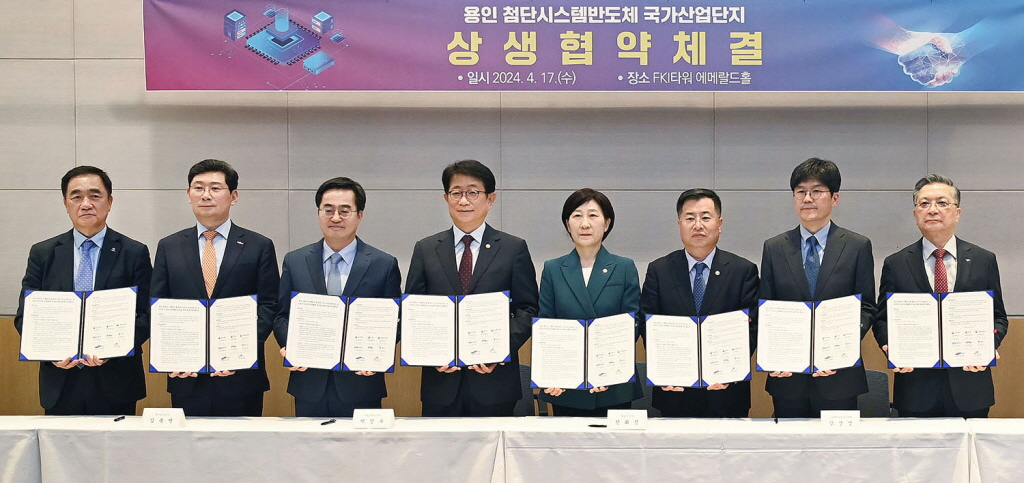산업통상자원부(장관 안덕근)와 국토교통부(장관 박상우), 환경부(장관 한화진)는 17일 경기도(도지사 김동연), 용인시(시장 이상일), 평택시(시장 정장선), 한국토지주택공사(사장 이한준) 및 삼성전자와 용인 첨단시스템반도체 국가산업단지(이하 용인 국가산단)의 성공적 조성 추진을 위한 상생협약을 체결했다.
정부·지자체·삼성전자·LH 등 8개 기관 협약
용수 공급안 포함·산업단지 계획 승인 신청
용인 반도체 국가산단의 2030년 공장 가동을 위해 중앙 및 지방 정부와 삼성전자, LH 등 8개 기관이 본격 손을 잡았다.
산업통상자원부(장관 안덕근)와 국토교통부(장관 박상우), 환경부(장관 한화진)는 17일 경기도(도지사 김동연), 용인시(시장 이상일), 평택시(시장 정장선), 한국토지주택공사(사장 이한준) 및 삼성전자와 용인 첨단시스템반도체 국가산업단지(이하 용인 국가산단)의 성공적 조성 추진을 위한 상생협약을 체결했다.
이번 상생협약식은 지난해 조성하기로 발표한 용인 국가산단을 신속히 추진할 수 있도록 관계 부처, 관련 지자체 등과 협력하는 방안을 마련하기 위해 진행됐다.
이번 상생협력을 기반으로 산업단지 조성에 박차를 가하게 된다.
특히 원활한 반도체 공장의 입주를 위해 평택의 송탄 상수원보호구역을 대체 취수원 마련을 전제로 해제하고 산업단지 및 인근 지역에 용수를 적기에 공급하는 방안 등을 포함했다.
상생협약서 체결 후 사업시행자인 한국토지주택공사는 곧바로 산업단지계획 승인을 국토교통부에 신청할 계획이다.
국토부는 용인 국가산단 내 2030년말 첫 공장 가동을 목표로 관련 절차를 대폭 앞당겨 추진하고 있다.
후보지 발표 이후 단계별(예타, 산업단지계획, 실시설계 등) 용역 통합발주, 예비타당성조사 면제 등으로 조성 속도를 높였다.
환경영향평가는 사전컨설팅과 패스트트랙 운영으로 신속히 추진하고, 토지 보상기간도 줄일 수 있도록 토지 보상 착수를 위한 해당 토지의 사전 조사와 주민 협의를 계획 수립 단계부터 선(先)이행하는 등의 노력을 하고 있다.
이와 같은 노력으로 부지조성 착공까지 기존에 7년 이상 걸리던 것을 3년 6개월로 반절 이상 단축할 예정이다.
또한 인접한 용인 이동 공공주택지구도 직주락(職住樂)이 집약된 도시로 조성해 우수 인력들을 위한 정주여건을 확보할 계획이다.
국토부 박상우 장관은 “우리나라 미래 핵심 먹거리인 반도체 산업이 글로벌 시장에서 굳건히 자리매김할 수 있도록 기업의 적기 투자를 위해 관계부처와 지자체의 역할이 매우 중요한 때”라며 “용인 국가산단은 관계부처, 지자체, 기업이 원팀으로 협력해 2026년 부지 착공을 목표로 신속하게 추진하고 있으며, 충분한 기반시설과 정주여건 확보로 반도체 산업 발전과 국가 경쟁력 강화에 기여하는 새로운 국가산업단지 성공모델로 만들어 가겠다”고 밝힌다.
환경부 한화진 장관은 “용인 국가산단의 적기 착공을 위해 정부, 지자체, 기업이 ‘원팀’으로 긴밀히 협력하여 협약을 차질 없이 이행하겠다”며 “반도체 생산에 막대한 양의 물이 필요하고, 용수 공급 시설 설치에 시간도 많이 소요되는 만큼, 세밀한 용수공급 계획을 수립하여 속도감 있게 실행하겠다”고 전했다.
강경성 산업부 1차관은 “오늘 이 행사가 용인 국가산단을 더욱 신속하게 조성할 수 있는 기폭제가 됐다고 생각하며, 이번 결과는 정부와 지자체, 공공기관과 기업이 우리 반도체 산업을 위해 협업한 좋은 사례가 될 것”이라며 “용인 국가산단, 용인 일반산단, 평택 고덕산단 등을 중심으로 622조원이 투자될 반도체 메가 클러스터가 우리나라를 넘어 전 세계 반도체 산업의 허브로 자리잡을 수 있도록 최선을 다하겠다”고 언급했다.
